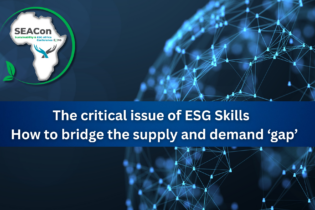In March of last year, the World Bank put out a report on electricity access in sub-Saharan Africa. The study measured how people were both able and unable to access electricity by region and country.
The findings were a wake-up call for policy makers. Much of Africa is lagging when it comes to the public’s ability to access the energy grid. On average, only 43% of people in Africa have access to electricity, which is just over half the global access rate of 87%. The report also warned that this percentage isn’t likely to shift, given Africa’s population growth. For many of us, the thought of living without access to electricity and water is unimaginable. But it’s a reality for hundreds of millions of people across emerging markets. The lack of access to these resources dramatically alters people’s quality of life; it also holds back economic growth and educational opportunities. There are two core challenges when it comes to ensuring universal access to energy and water. The first is connecting remote locations to the grid. For marginal communities which are positioned far away from urban centres, the cost of bringing these communities online can seem prohibitive. And then there’s the ability to provide power 24/7. How many people who live in marginal communities will be able to pay for both grid connectivity and reliable power? For most, the cost of connecting and ensuring a power supply is out of reach. But there are companies like Schneider Electric, who are working on providing solutions to powering marginal communities. The firm is using its technology to provide sustainable power and water to people through its sustainable projects in South Africa. “Having access to a safe, reliable source of energy is a basic human right, and yet far too many people do without. We’ve got to change this, and it has to happen through green, sustainable technologies,” explains Zanelle Dalglish, Head of Sustainable Development and Academy, Schneider Electric Anglophone Cluster. Technology and opportunities for South African communities A successful and on-going partnership between the University of Johannesburg (UJ) and Schneider Electric South Africa has ensured that the Gwakwani Village has had access to basic services through sustainable access to energy interventions. Gwakwani is a small rural village in Limpopo that demonstrates the power of successful partnerships to uplift communities in a sustainable manner. This partnership has empowered the community through eco-friendly sustainable contributions to an area that is devoid of basic services or roads. The access to energy project started with the installation of solar lighting solutions to the homes and solar streetlights for area lighting. “Initially, we trained female entrepreneurs from the village to sell and maintain our solar powered portable LED lamps, with its mobile phone charger, the Mobiya TS 120S,” said Dalglish. The units are especially suited for the demanding rural environment of Gwakwani, as it is an energy efficient, eco-friendly and robust portable lamp producing 120-lumen light output.”The project rapidly expanded as a result of the successful partnership and the community now boast a solar water pumping system, solar containerised bakery, containerised creche with solar powered TV for educational purposes, as well as a solar powered cold storage facility. Creating access to energy has empowered this community as they are now able to grow sustainable food sources due to drip irrigation as a result of solar water pumping.
They have also become economically active as the solar powered bakery enabled the establishment of a cooperative where more than 120 loaves of bread can be sold to neighbouring communities daily to generate an income for the village. “What we want to do is put in place technologies that are effective enough to change lives, but which are also simple enough for them to be looked after by those same communities,” explains Dalglish. “These solutions are green, they’re suited to the landscapes of the region, and they’re efficient and environmentally friendly.” For Schneider Electric, the challenge of how to connect marginal communities to the grid is an opportunity in disguise. A focus of the Schneider Electric Foundation is training and development, particularly for renewable technologies in Africa and Asia. In South Africa alone, more than 30 000 people have been trained since 2013 both informally in communities and formally through the support from the Schneider Electric Foundation and the Schneider Electric Academy. Last year, Schneider Electric joined a global coalition to drastically expand trainings in the energy sector through the Power for All #PoweringJobs campaign. While its primary aim is to address the skills gap in emerging countries, the campaign is also focused on speeding up the deployment of decentralised renewable energy solutions. Dalglish points out that emerging economies stand to gain the most from the adoption of renewable solutions if they focus more on training. “The renewable energy jobs market is huge. The direct job potential for decentralised renewable energy solutions is 4.5 million by 2030. And data suggests that solar lighting alone could generate two million jobs. Many of these new roles will be created in emerging markets. Governments in emerging markets must see the potential of renewable energy to transform not just marginal communities, but their societies as a whole,” concludes Dalglish. About Schneider Electric At Schneider, we believe access to energy and digital is a basic human right. We empower all to make the most of their energy and resources, ensuring Life Is On everywhere, for everyone, at every moment. We provide energy and automation digital solutions for efficiency and sustainability. We combine world-leading energy technologies, real-time automation, software and services into integrated solutions for Homes, Buildings, Data Centers, Infrastructure and Industries. We are committed to unleash the infinite possibilities of an open, global, innovative community that is passionate about our Meaningful Purpose, Inclusive and Empowered values.






